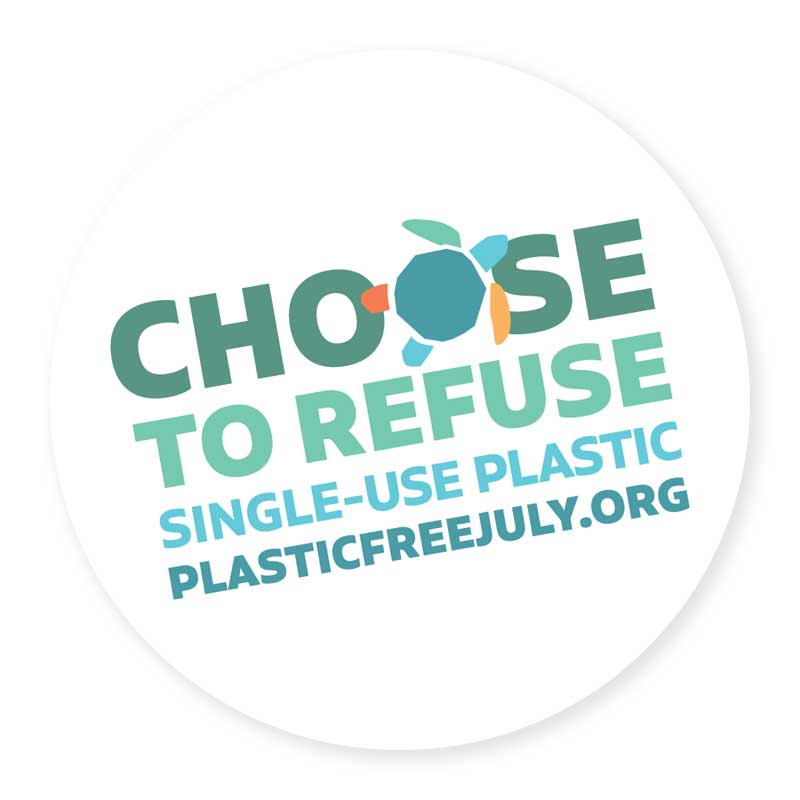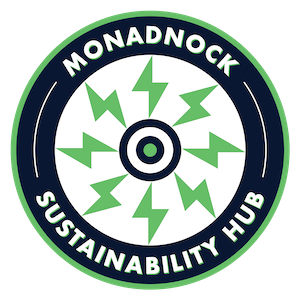 By Patricia Beffa-Negrini, Ph.D. Originally Published in The Monadnock Shopper News, Green Monadnock column, July 2024.
By Patricia Beffa-Negrini, Ph.D. Originally Published in The Monadnock Shopper News, Green Monadnock column, July 2024.
The word is out about the severe impacts of plastic — trash on land and sea, microplastics in the environment, and hormone disrupters harming our health. In honor of Plastic Free July® — a global movement helping millions be part of the solution to plastic pollution — let’s imagine a world without single-use plastics.
In the ’70s, recycling came to the forefront. Plastic producers told us to “Reduce, Reuse, Recycle.” But all I heard was “Recycle, Recycle, Recycle.” Those words led me to Wishcycle, throwing non-recyclable items into the bin, hoping they would be recycled anyway. Not only do wish-cycled items eventually end up in a landfill, they clog sorting machinery, contaminate materials in the recycling stream, and require extra labor to sort.
Another “cycling” term, downcycling, describes how recycled items become of lower value than the originals. Unlike glass, aluminum, paper, and other materials, plastics are so complex that a plastic bottle cannot be remade into a plastic bottle. Instead, it might be fashioned into fibers for a shirt or fabricated into decking boards. Eventually, that plastic cannot be recycled further and is landfilled or incinerated. Sadly, recycling plastic delays the inevitable. Plastic producers have known for 30 years that recycling plastics doesn’t work.
Let’s instead join the Resource Revolution to turn away from the “cycling” of the word “re-cycling” and move toward the “re’s.” The Resource Revolution and its partner, Re-X Before Recycling, will bring about a world where we do not second-guess every purchase. Shopping will be a breeze — you will walk into a box store or a supermarket, and what’s for sale will not be designed to be disposed of. Instead, built-to-last or refillable products will be available with minimal packaging.
To achieve this vision — which steps away from throw-away — businesses and entrepreneurs are actively rethinking, redesigning, and reimagining materials, products, and food packaging. We can help them by “reconsidering” and “refusing.” When it comes time to shop, reconsider your potential purchase and say, “Nope, I don’t want plastic packaging. I’ll buy another brand instead because its design doesn’t perpetuate waste.” Personally, I refuse plastic packaging by buying my laundry detergent, shampoo, deodorant, and moisturizer in solid forms, not in plastic containers.
We live in a “take, make, waste” society. But what if we repaired and reused things instead? The fashion industry creates more than a third of the plastic waste in the oceans, and only 1% of clothes are recycled into new garments. Imagine if, instead of discarding our clothes and other items, we used creativity and repaired them. Repair cafes, such as MAXT Makerspace in Peterborough, along with the Kingsbury Makerspace and the Library of Things at the Keene Public Library, are cropping up to help us fix what we already own and reduce the need for unnecessary purchases.
Let’s rethink and reconsider plastic produce bags. Sure, you can “recycle” them through a plastic film collection. However, reusing one organic cotton produce bag once per week for a year saves more than 50 plastic produce bags from being made and disposed of! If you end up with plastic bags, reuse them before recycling.
After “rethink, redesign, reimagine, reduce, refuse, reconsider, reuse, and repair, only then do we arrive at “recycle.” Check with your recycling center or transfer station to recycle effectively, not wishcycle.
Finally, if you cannot repurpose, reuse, repair, or recycle the stuff you have, recover its parts to be used again in a circular system. To recover waste instead of landfilling or burning, it must have value. Think about recovering parts of electronics, cars, solar panels, and even entire buildings! Rethinking plastics can help you shift your consumption mindset and discover ways to recover all sorts of materials. These efforts are an exciting part of the coming Resource Revolution because they will create new jobs in product/package design and materials recovery in a circular economy.
Freedom from single-use will take more than making personal choices. It’s about collective action. Talk to family, challenge friends, host a zero-waste picnic, join a plastic-free action or committee, and vote for environmentally-conscious politicians. Avoiding plastic is challenging, but a world without plastic pollution is achievable. Together, we can be a part of the Resource Revolution!
Patricia Beffa-Negrini, Ph.D., lives in Nelson, NH, and is a retired Registered Dietitian/Nutritionist. She maintains websites for the NH Network for Environment, Energy, and Climate and their Plastics Working Group’s Ten Towns • Ten Actions Toolkit to rethink plastics. She is a Board member of the Monadnock Sustainability Hub, a NH nonprofit whose purpose is to cut emissions from our region and thus address climate pollution. Her email is nelsoncommunitypower@gmail.com.
